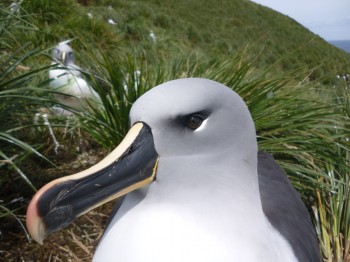Akiko Shoji (Environment Canada, National Wildlife Research Centre, Ottawa, Canada) and colleagues have published early-view in the ornithological journal Ibis on aspects of incubation in seabirds, including five ACAP-listed albatrosses and petrels.
The paper’s abstract follows:
“Energy costs during breeding play an important role in the evolution of life history traits. Seabirds show substantial variation in both incubation shift length (ISL) and metabolic rates. However, it is still unclear how variation in life history traits relates to incubation metabolic rates (IMR). Here, we examine the relationship between IMR and life history traits, including ISL, fledging strategy (precocial to altricial), incubation period, nest location (surface vs. underground) and clutch mass relative to adult body mass for 30 species of seabirds collated from the literature. Using both conventional non-phylogenetic and phylogenetic generalized least-squares approaches, we show that IMR is negatively associated with ISL, relative clutch mass and with underground nesting, while fledging strategy and incubation period have no impact on IMR once phylogeny is accounted for. Maximum likelihood reconstructions further suggest than ancestral seabirds had average ISL and relative clutch mass, and were surface nesters. We conclude that lower metabolic rates during incubation are associated with both an increased incubation shift length that allows animals to travel farther, as well as the evolutionary emergence of underground nesting that requires less social interaction.”

The Grey-headed Albatross is included in the study, photograph by Richard Phillips
Reference:
Shoji, A., Elliott, K.H., Aris-Brosou, S., Wilson, R.P. & Gaston, A.J. 2014. Predictors of incubation costs in seabirds: an evolutionary perspective. Ibis DOI: 10.1111/ibi.12219.
John Cooper, ACAP Information Officer, 08 November 2014

 English
English  Français
Français  Español
Español